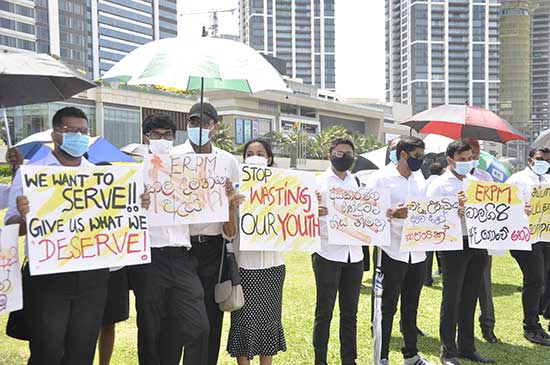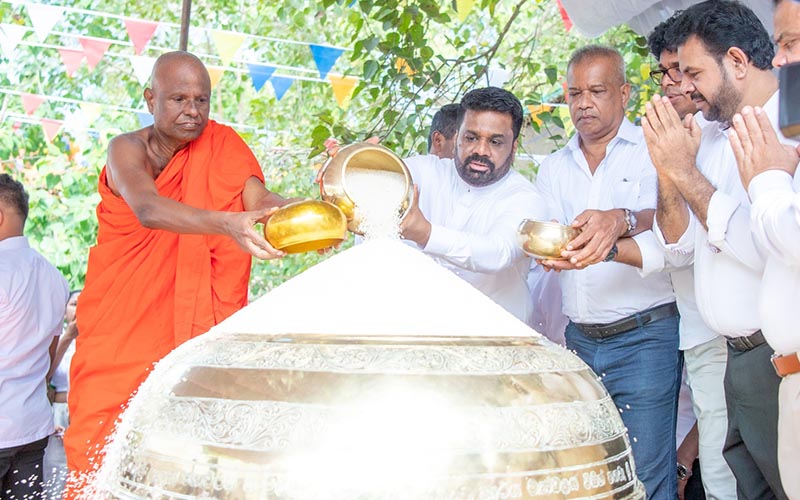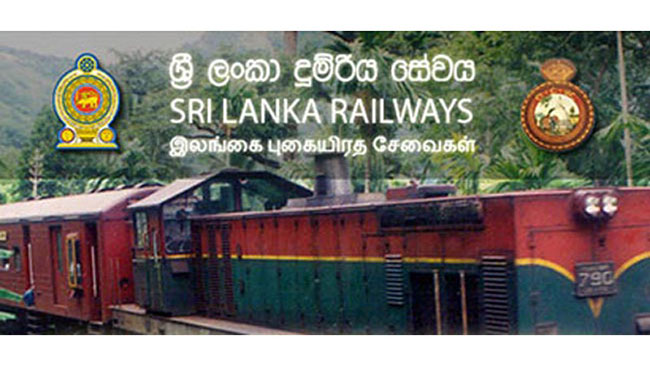News
Foreign medical graduates stage protest against undue delay over conducting ERPM

The inordinate delay on the part of the Sri Lanka Medical Council (SLMC) to conduct the Examination to Register to Practice Medicine (ERPM) has violated the fundamental rights of around 1,000 foreign medical graduates, the students’ association charged.
“We decided to return to Sri Lanka to pursue a career in medicine and serve our motherland, but the prolonged delay in conducting this mandatory examination has resulted in a gross waste of our time, money and efforts”, the Foreign Medical Graduates’ Association said in a statement following a silent protest at the ‘agitation site’ opposite the Presidential Secretariat on Wednesday.
The SLMC is the statutory council responsible for conducting the ERPM, and all foreign medical graduates with medical degrees from universities recognized by the SLMC are eligible to sit for the exam, as long as they submit their degree and other supporting documents to the SLMC and obtain a Degree Approval, the statement noted.
As outlined in the Degree Approval document, the ERPM consists of four parts (A, B, C, D) and the SLMC is responsible for conducting each part at least twice each year. The last ERPM (part A and D) exam was held in July 2019. Since then, for over one year, the exams have not been held. The SLMC failed to officially advise the foreign medical graduates awaiting the examination regarding the reasons for the delay, the students complained.
“There is now a cumulative total of about 1,000 foreign medical graduates awaiting the examination. It was said that the reason for the delay were petitions filed against the SLMC in the Supreme Court. However, this was never officially made known by the SLMC until 08.06.2020, when some foreign medical graduates submitted a RTI (Right to Information) to the SLMC to find out officially the reason for the delay in conducting the ERPM, the statement further said.
“The response to the RTI, dated 12.06.2020, signed by SLMC Registrar, Dr. Ananda Hapugoda, mentioned six cases filed against the SLMC in the Supreme Court as the reason for the delay. The Registrar also assured us that after the cases were over, there will be no hindrance in conducting the ERPM examination”, the statement noted.
The six petitions that named the SLMC as the respondent were filed by foreign medical graduates, whose application for Degree Approval was rejected by the SLMC on the basis that they did not have the necessary A/L results to practice medicine. On July 23, 2020, the Supreme Court ruled in favour of petitioners outlining that, according to the Medical Ordinance of Sri Lanka, there is no such minimum A/L requirement for practicing medicine in Sri Lanka, and that the SLMC was operating outside its rights in imposing arbitrary requirements upon foreign medical graduates, the statement asserted.
Following this, on August 12, 2020, the SLMC released a notice that called all eligible candidates to apply for the ERPM Part A and D. The period for applications was from August 24 to September 7, 2020. Candidates who had been waiting eagerly for over a year, immediately made the necessary payments (Rs. 20,000 per person), and handed over their applications. However, on September 3, 2020, the SLMC released another notice that the closing date for applications had been extended indefinitely. No reason was outlined for this, it further said.
“A few concerned candidates visited the SLMC seeking answers. Though no answer was given in writing, speaking to some officials of the SLMC led us to believe that there are some internal issues within the SLMC over the Supreme Court ruling, and this has resulted in the exam being delayed indefinitely”, the statement added.
Latest News
We are working to stabilize and restructure an economy that was in disarray -President

The National New Paddy Harvesting Festival (Aluth Sahal Mangalya), a traditional annual ceremony of offering the first portion of the freshly harvested Maha season paddy to the sacred Sri Maha Bodhi, was held this morning (04) under the patronage of President Anura Kumara Disanayake at the historic Sri Maha Bodhi premises in Anuradhapura.
The ceremony was organized by the Ministry of Agriculture and the Department of Agrarian Services under the theme “In unison, let us cultivate the land, to build a self-sufficient nation” (අහරින් ස්වයංපෝෂිත දැයක් තනන්නට එක මිටට ගොවි බිමට), following the guidance of the Atamasthanadhipathi, the most Venerable Pallegama Hemarathana Nayaka Thera.
This ritual, which dates back to the era of ancient monarchs, saw the participation of farmers from across the country. In accordance with tradition, they prayed for timely rains and fertile fields and invoked blessings for a self-sufficient and prosperous economy through agriculture.
President Anura Kumara Disanayake first paid homage and received blessings from the sacred Jaya Sri Maha Bodhi before joining the ceremonial proceedings.
The sacred procession, which carried the newly harvested paddy from near the historic Sinha Kanuwa in Anuradhapura, arrived at the sandy courtyard (වැලි මලුව) of the Sri Maha Bodhi, marking the ceremonial commencement of the New Paddy Harvest Festival.
The Most Venerable Pallegama Hemarathana Nayaka Thera commenced the ritual by filling the golden bowl with the new paddy, after which representatives from all provinces added paddy from their respective regions, symbolically filling the golden bowl.
President Anura Kumara Disanayake also participated in this ritualistic moment, amidst the chanting of Pirith by the Maha Sangha.
A vessel of pure bee honey, traditionally offered to the Sri Maha Bodhi, was ceremonially presented to the President by Deputy Leader of the Vedda Community U.W. Bandiyala Eththo.
The vessel of ghee, brought from the historic Saman Devalaya in Sabaragamuwa, was also presented to President Anura Kumara Disanayake, to be used in the customary ghee offering at the Sri Maha Bodhi.
The President also received the commemorative plaque of the National New Paddy Harvest Festival and presented tokens of appreciation to farmer leaders who have made significant contributions to the development of the country’s agriculture sector.
As part of the initiative to secure a pest-free harvest, the President participated in the distribution of pest-resistant seed paddy to farming communities across the provinces.
Addressing the subsequent official ceremony, President Anura Kumara Disanayake stated that the current government is working to transform an economy that was in disarray. He noted that the Paddy Marketing Board is burdened with a debt of Rs. 28 billion, while harvested paddy is being left to spoil in storage.
The President emphasized that the current administration has accepted the responsibility of restoring and restructuring this disorderly system. He added that the government expects the support not only of the state machinery related to agriculture but also of all farming communities. He affirmed the intention to integrate Sri Lanka’s cultural and traditional systems to reclaim the legacy of the agricultural economy and thereby strengthen the national economy.
President Disanayake further stated that the country’s ancient kings achieved greatness through their contributions to agriculture and irrigation and that self-sufficiency in food was a critical factor in that success.
He highlighted that sustainable development has become a global discourse today and that Sri Lanka’s “Tank Cascade System” or “Vapi System,” stands as a remarkable example of sustainable development. The country’s irrigation system, which dates back nearly 2,000 years, continues to contribute to the advancement of agriculture even today.
As such, the government has allocated Rs. 2 billion in the current budget to rehabilitate the irrigation system and renovation work on the North Central Maha Ela Project has already commenced to revitalize the country’s agricultural industry. He added that the government also plans to develop seed farms to produce self-sufficient seeds, while protecting genetic ownership.
He further emphasized the need for fair prices for agricultural produce, both for farmers and consumers. Due to long-standing market distortions, the government will intervene over the next two to three harvesting seasons to ensure both parties receive fair prices.
The President also stated that the necessary provisions for such state interventions have been made in the current budget. Steps have been taken to create storage capacity to hold 300,000 metric tons of paddy, which is expected to mitigate market distortions going forward.
Among those present at the occasion were the Chief Incumbent of the Ruwanweliseya and Chancellor of the Rajarata University, Most Venerable Ithalawetunuwewe Gnanatillake Thera, the Chief Incumbent of the Lankaramaya, Most Venerable Ralapanawa Dhammajothi Thera and members of the clergy; Minister of Agriculture, Livestock, Lands and Irrigation K.D. Lalkantha; Minister of Trade, Commerce, Food Security and Cooperative Development Wasantha Samarasinghe; Governor of the North Central Province Wasantha Kumara Wimalasiri; and Deputy Minister of Agriculture and Livestock Namal Karunaratne, along with a large number of farmer leaders and other dignitaries.
- (PMD)
Latest News
Indian PM Modi arrives in Sri Lanka on a three day state visit

Prime Minister of India Narendra Modi arrived in the island a short while ago on a three-day state visit.
The Indian Prime Minister was received at the Katunayake International Airport by Sri Lanka’s Minister of Foreign Affairs Vijitha Herath.
PM Modi is accompanied by Minister of External Affairs S. Jaishankar, Indian National Security Advisor Ajit Doval, Indian Foreign Secretary and several senior officials of the Government of India.
Latest News
Special Train Services during Sinhala and Tamil New Year

The General Manager of Railways has announced that the following special train services will operate during the Sinhala and Tamil New Year period.
1. From Colombo Fort to Badulla – departing Colombo Fort at 1930 hrs on 11th, 12th, 19th and 20th April
2. From Badulla to Colombo Fort – departing Badulla at 1750 hrs on 11th, 12th, 19th and 20th April
3. From Galle to Anuradhapura – departing Galle at 0400 hrs on 12th and 13th April
4. From Anuradhapura to Galle – departing Anuradhapura at 1500 hrs on 12th and 13th April
5. From Colombo Fort to Galle – departing Colombo Fort at 120 hrs on 10th, 11th, 15th and 20th April
6. From Galle to Colombo Fort – departing Galle at 0610 hrs on 11th, 12th, 16th and 21st April
7. From Colombo Fort to Galle – departing Colombo Fort at 1330 hrs on 12th and 13th April
8. From Colombo Fort to Kankasanthurai [Intercity Express] – departing Colombo Fort at 0530 hrs on 11th and 18th April
9. From Kankasanthurai to Colombo Fort [Intercity Express] – departing Kankasanthurai at 1350 hrs on 11th and 18th April
10. From Beliatta to Colombo Fort – departing Beliatta at 0825 hrs on 12th, 13th, 18th, 19th and 20th April
-

 News5 days ago
News5 days agoBid to include genocide allegation against Sri Lanka in Canada’s school curriculum thwarted
-

 Sports6 days ago
Sports6 days agoSri Lanka’s eternal search for the elusive all-rounder
-

 News7 days ago
News7 days agoGnanasara Thera urged to reveal masterminds behind Easter Sunday terror attacks
-

 Sports2 days ago
Sports2 days agoTo play or not to play is Richmond’s decision
-

 News6 days ago
News6 days agoComBank crowned Global Finance Best SME Bank in Sri Lanka for 3rd successive year
-

 Features6 days ago
Features6 days agoSanctions by The Unpunished
-

 Features6 days ago
Features6 days agoMore parliamentary giants I was privileged to know
-

 Latest News4 days ago
Latest News4 days agoIPL 2025: Rookies Ashwani and Rickelton lead Mumbai Indians to first win











